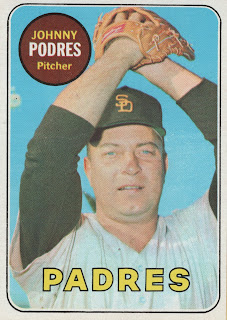The Cardinals and Tigers were powerhouses in their respective leagues, easily advancing to the World Series. This was a rematch of the 1934 World Series, when the Gashouse Gang of the Cardinals had bested the Tigers in seven games. The Tigers would prevail this time, winning their first title since 1945, and their third World Series title overall as the Cardinals couldn't repeat after winning in 1967 against the Red Sox.
World Series cards were a key subset in Topps flagship sets throughout the 1960s and 1970s, with a card highlighting each game along with a series capping "Celebration" card. Topps designed its World Series cards in its 1969 set to have the appearance of the front page of a newspaper, with The Sporting News getting some free (?) publicity as the paper's banner.
Building the Set / Card #76
February 23, 2023 from Glen Morgan, WV
A few nights after I learned of Tim McCarver's passing, I found his two cards from the 1969 Topps set from eBay seller nflmlb with reasonable Buy It Now prices. The two cards were a combined $11 and arrived a day or two later from Morgan, West Virginia.
February 23, 2023 from Glen Morgan, WV
A few nights after I learned of Tim McCarver's passing, I found his two cards from the 1969 Topps set from eBay seller nflmlb with reasonable Buy It Now prices. The two cards were a combined $11 and arrived a day or two later from Morgan, West Virginia.
My earliest memories of McCarver are as a Phillies broadcaster in the early 1980s, and I met him in the Phillies' broadcast booth the same night I played catch on the Veterans Stadium outfield turf with Bob Dernier. (I need to memorialize that full story at some point, likely over at The Phillies Room.) My strongest memories of McCarver involve by maternal grandfather, my Pop-Pop, tuning in to watch Mets games, just so he could root against the hated Mets and criticize McCarver for his broadcasting style. My Pop-Pop loved the Phillies, never missing a televised game, and he'd sometimes spend an evening flipping channels from the Phillies (Channel 17, then 29), to the Yankees (Channel 11), to the Mets (Channel 9) depending on which game was the most interesting that night. He's the one who first clued me in to the life hack of having the Phillies game on the radio and turning down the volume of the TV set so that he could follow Harry Kalas and Richie Ashburn when they moved over to radio for a few innings. I did that throughout the Phillies' entire 2022 playoff and World Series run, never hearing a word of any of the national broadcasters and preferring to listen to Scott Franzke tell me what was going on. In any event, I can't remember any specific reason why my Pop-Pop held McCarver in such low regard, and maybe he's giving McCarver an earful now in that great ballpark in the sky.
With the series tied at 1-1, the two teams faced off on October 5th at Tiger Stadium. Ray Washburn (#415) was on the mound for the Cardinals, facing off against the Tigers' Earl Wilson (#525). Al Kaline (#410) hit a two-run home run in the third to give the Tigers a 2-0 lead, but the Cardinals would take the lead for good in the fifth. With Wilson starting the inning, Lou Brock (#85) singled to center, stole second and came home on a double to left by Curt Flood (#540). Roger Maris walked next, ending Wilson's day and bringing reliever Pat Dobson (#231) into the game. McCarver launched a three-run home run to deep center field, scoring Flood and Maris and giving the Cardinals a 4-2 lead. Orlando Cepeda (#385) would put the game out of reach in the seventh with his own three-run home run, again scoring Flood and Maris.
Topps uses a photo of McCarver crossing the plate on the front of the card, and goes with a weird, hybrid box score on the back, showing hitting and fielding summaries along with a line score. Mike Shannon (#110), the on-deck batter, has his head cut off by Topps, so I'm not going to tag him as actually appearing on this card. This Maris cameo marks his only appearance in the 1969 Topps set, as the slugger retired following the 1968 World Series. Tommy Matchick (#344), Wayne Comer (#346) and Jim Price (#472) are all shown without positions for the Tigers in the box score, and each of them pinch-hit at some point during the game.
Sources:


.jpg)





.jpg)










.jpg)









.jpg)



.jpg)







.jpg)



.jpg)



.jpg)







